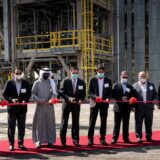Sasol announces decision to drop U.S. GTL project, but sees opportunities in base oils business
Sasol, an international integrated chemicals and energy company, based in South Africa, yesterday unveiled its “refined corporate strategy,” which the company says “sets a clear path for sustainable growth and accelerated shareholder returns.”
“In developing our strategy, we considered both the opportunities and risks we face, informed by developments in the external environment. It is clear that megatrends influential to our business will result in greater demand for chemicals and energy products in key markets we serve,” says Sasol President and CEO Stephen Cornell.
Translating Sasol’s strategy into measurable value for shareholders will comprise two distinct phases.
“From now until 2022, Sasol will focus on delivery of the Lake Charles Chemicals Project (LCCP) in the U.S. and the Production Sharing Agreement in Mozambique, while extracting further value from our existing portfolio of diversified assets. In this period we are targeting an improvement in return on invested capital (ROIC) of at least 2% on our financial year 2017 base. This will be achieved through continuous improvement that will encompass various initiatives across our value chain,” says Paul Victor, Sasol’s chief financial Officer.
He adds that successful delivery of these initiatives will drive earnings growth and greater efficiency and effectiveness, which in turn, support the earlier delivery of returns to shareholders through an increase in Sasol’s dividend payout to 40% or 2.5 times cover by 2022.
“Beyond 2022, we will focus on building an investment portfolio of smaller to medium-sized organic and inorganic opportunities, in the range of USD 500 million to USD1 billion. This will be directed towards our growth focus areas in specialty chemicals, exploration and production and retail fuels,” Victor says.
“In the longer term, we will leverage our investment base with flexibility for greater growth that we will drive through partnerships.”
Sasol announced several key decisions in areas where the company does not believe it can maintain a leading position or deliver strong returns.
One of several important announcements was Sasol’s decision not to invest further in greenfield gas-to-liquids (GTL) projects, including its proposed GTL project in the U.S. In January 2015, Sasol announced it was delaying a final investment decision on the project to conserve cash in response to lower oil prices.
“While our current GTL assets are generating good returns and cash flows, the value proposition for Sasol to build new GTL projects is uneconomic against a volatile external environment and structural shift to a low oil price environment.”
Cornell adds Sasol will maintain its industry-leading position in Fischer-Tropsch (FT) technology.
“We will continue to work on opportunities to optimise and improve our existing facilities in regard to catalyst performance, product yields and energy efficiency. We also see further opportunities to high-grade the value from our GTL molecules through base oils extraction, and we will continue to license and support our FT technology,” says Cornell.
Sasol has also decided not to invest in any additional crude oil refining capacity.
“This decision was informed by the large investments that will be required to meet changing fuel specifications in South Africa and a lack of any clear competitive advantage for Sasol outside our existing position in Secunda,” says Cornell.
“While we have a solid foundation business in commodity chemicals and the world-scale LCCP under construction in the U.S., the risk profile to execute such projects alone, in the future, is larger than what Sasol wishes to undertake. Such investments in feedstock-advantaged locations may still be considered, but we will not entertain wholly-owned investments in similar megaprojects, such as the LCCP, going forward.”
In line with enhancing its robust foundation, Sasol will continue to invest in extracting further value from its chemicals facilities in the U.S. and South Africa, while also pursuing commodity chemicals investments where this can support the company’s desire to grow its specialty chemicals portfolio.
Sasol’s strategic choices were based on key megatrends and assumptions including global population growth and further urbanisation, the move to even greater efficiency and performance, in all aspects of business, supported by digitalisation and sustained volatility in both oil prices and exchange rates.
.jpg)







